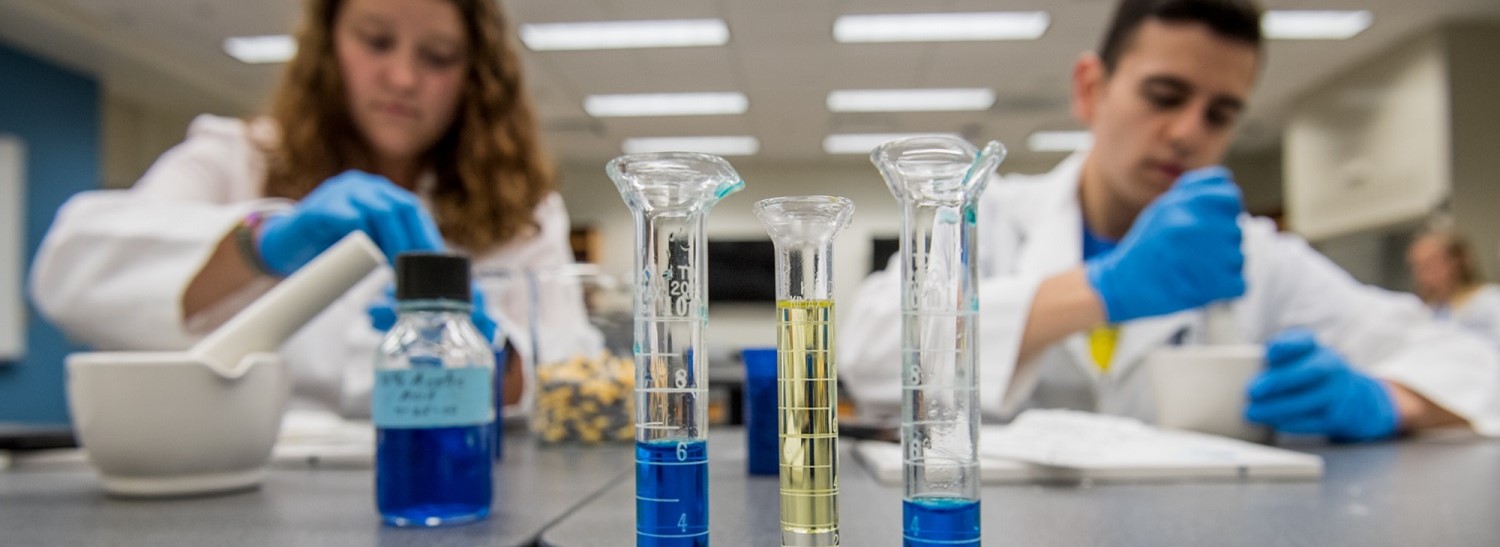|

Click on a link to be taken to the entry below.
Program Application Requirements
Preparation for the Major
A sound, foundational education in science and mathematics courses is an essential part of preparation for the study of pharmacy. Good written and verbal communication skills are important. Students planning to transfer from another college or university should consult with the College of Pharmacy and Allied Health Professions early in their academic careers to plan coursework that will transfer to the College of Pharmacy and Allied Health Professions. For more information, visit the website.
Application Process
All students seeking admission to the 4-year professional program leading to the Doctor of Pharmacy degree must submit an application for the professional program. Applications are available from the College of Pharmacy and Allied Health Professions website. The deadline for applying for admission for the fall semester is February 1. Limitations in the size of the physical facilities, the number of faculty and the number of advanced pharmacy practice experience sites make it necessary to limit the class size in the professional program. Each student admitted into the professional program is required to authorize and pay for a criminal background check. The background check report is automatically sent to the student and to the College and must be approved by the Admissions Committee.
Selection is competitive and based upon several factors including pre-pharmacy coursework, written and oral communication skills, knowledge of the profession, residency status and other factors. Any student who anticipates successful completion of the pre-pharmacy requirements prior to fall semester is eligible to apply.
Notification of acceptance into the professional program will be made by March 15 for students that apply by the February 1 deadline. Students admitted to the professional program must submit a non-refundable deposit to secure their position for the fall semester. That deposit will be applied to student’s account in the fall semester.
Curriculum/Plan of Study
The curriculum is divided into a 2-year pre-pharmacy and a 4-year professional program phase. The pre-pharmacy courses provide a solid knowledge base and ability to use critical thought processes in the biological and physical sciences.
The four years of the professional program incorporate a solid foundation of pharmaceutical science courses as well as a comprehensive sequence of therapeutics and professional practice courses. Students earn a B.S. in Pharmaceutical Sciences after successful completion of the first two years of the professional program. The application of drug knowledge, basic science, and critical thinking to resolve problems of drug distribution and patient care are emphasized throughout the curriculum. In their first three years of the program, students gain initial practice experience through introductory pharmacy practice experiences in settings such as community and hospital pharmacies. In the final year of the program, students have an opportunity to apply knowledge and pharmacy care principles to pharmacy practice situations in a series of advanced pharmacy practice experiences in a variety of patient care settings which include patient care areas of hospitals, nursing homes, community pharmacies, hospital pharmacies, Indian Health Service facilities and clinic pharmacies. Students will work side-by-side with licensed pharmacists and other healthcare professionals; examples include physicians, nurses, respiratory therapists, social workers, and medical laboratory personnel.
College of Pharmacy and Allied Health Professions Regulations
Students in the College of Pharmacy and Allied Health Professions are governed by the regulations which apply to all students at SDSU but are also governed by requirements established by the College. These requirements are presented in detail in the Pharmacy Student Handbook and include:
Progression
Progression standards for students in the Pharm.D. program are set to ensure graduates are prepared to provide pharmacy services to the public. The integrated curriculum relies on information and skills garnered in previous courses. Therefore, students’ success depends on achieving a minimum level of performance in each course. Minimum level of performance is defined as a grade of C or better based on University Catalog grade definitions. A grade of D is defined in terms of “insufficient” and “inadequate” according to the University Catalog. A grade of F is defined in terms of “failure.” D, F, and U (unsatisfactory) grades do not represent a minimum level of performance need to develop skills, abilities, and knowledge of a general practitioner.
Refused Status
A student will be placed on refused status if the student:
- Earns a D, F, or U in a pharmacy course.
- Does not complete the Pharm.D. program within six years of starting the professional program.
Class Standing Requirements
Standing - In order for students to enroll in the fall semester of the pharmacy program, students must meet the class standing requirement. These are defined as follows (note: “completion” means a passing grade in each pharmacy course and maintaining semester and cumulative PHA GPA requirements):
- P1 Year Standing - The student must have been admitted into the professional program.
- P2 Year Standing - Completion of all PHA 300 level required courses and PHA 119/101 and PHA 219.
- P3 Year Standing - Completion of all PHA 400 level required courses. PHA 610, a bachelor’s degree, and all capstone activities are required to begin the fall semester. Completion of all required PHA 700, non-advanced pharmacy practice experience courses are required to progress to the subsequent semester.
- P4 Year Standing - Completion of all PHA 600-700 level required, non-advanced pharmacy practice experience courses, and 300 hours of IPPE.
|